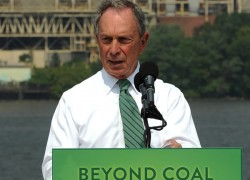
Criticism spanned the political spectrum, as consumers expressed outrage over the plan to ban sweetened beverages in cups or containers larger than 16 ounces. Even comedy newscaster Jon Stewart—hardly known as an anti-regulation ideologue—took a shot, noting that the proposed ban “combines the draconian government overreach people love with the probable lack of results they expect.”
Stewart is right. We can only hope that the idea fizzles out like a day-old bottle of Coke.
The ban, meant to reduce obesity among New Yorkers, would apply to restaurants and delis, movie theaters, stadiums, and even street vendors. On the forbidden list would be all drinks in a container exceeding 16 ounces that contains sugar, unless it is 70 percent or more fruit juice or milk. The plan will be put before the city’s Board of Health for approval, bypassing the city council.
The plan has so many flaws it is hard to know where to begin. Even putting aside the questionable science—the connection between soda and obesity is far from clear—the plan is unlikely to have the trimming effect on Big Apple waistlines that the mayor seeks.
Customers at fast-food restaurants, for instance, could easily circumvent the limits with free refills (unless the city also caps the number of trips to the dispenser). More broadly, even if consumers’ soda intake is reduced, what’s to keep them from getting their sugar fix elsewhere, perhaps using the money saved on sodas to buy a candy bar or two?
It’s the regulatory equivalent of squeezing a balloon. Restricting one poor nutrition option doesn’t mean the alternatives chosen will not be equally poor—especially if people are as ignorant or apathetic about their own health as the mayor seems to believe.
Contempt for consumers is, in fact, at the heart of this proposal. It has a distinct smell of elitism about it. It is built on the fundamental assumption that the Great Unwashed who drink carbonated beverages can’t be entrusted with their own health. These poor unfortunates should not be allowed to waste their money on Mountain Dew; they should be spending it on vanilla lattes as their betters do.
One commentator observed that “it’s notable that a 24-ounce McDonald’s Coke (with 81g of sugar) would be banned, but the much pricier 24-ounce Starbucks White Chocolate Mocha Frappucino (with 87g of sugar) would likely not, due to its milk content.”
Of course, the restrictions are hardly likely to expand beyond the currently proposed definitions. If sodas are to be restricted, why not fruit juices, which are also high in sugar? The idea isn’t far fetched. Anti-obesity advocate Barry Popkin, for instance, urges that consumers eat whole fruits instead of juices.
It’s hard to see where this will all end. As the editors of the Los Angeles Times suggest, the “next logical step would be to require restaurants to serve vegetables with every food order, or to require every New Yorker to join a health club, or to ban ice cream.”
Such worries sound fanciful today, dismissed as the product of overactive regulatory imaginations. But the same could be said of banning big sodas just a few years ago.
Americans are right to be outraged at Bloomberg’s proposal. The message they should send to him and other would-be regulatory nannies: Put a lid on it.
Source material can be found at this site.









